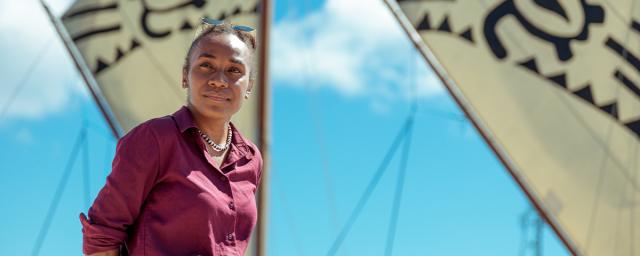
Cynthia Houniuhi, a founding member of Pacific Island Students Fighting Climate Change stands in front of the sailing vessel, the Uto ni Yalo. (Photo: Tini Media/Oxfam)
How do we quantify the value of our future? What lengths do we go to ensure this future? And to whom is this duty owed?
This is what drives the Pacific Islands Students Fighting Climate Change (PISFCC) - this innate duty of care shouldered by the people of the Pacific. The very same duty held by the 27 students who founded the ICJ Advisory Opinion Campaign (ICJAO Campaign).
What began as a simple assignment question in their university class, sparked the start of a global campaign to seek definitive clarity from the International Court of Justice on the obligations of states regarding climate change, and the consequences for not abiding by those obligations, with special consideration of small island developing states, and present and future generations.
In essence, a campaign to take the world’s biggest problem, to the world's highest court.
For its founding members, this campaign was more than just precedent and procedure. It was about the weight of belonging to places whose existence hangs in the balance. The duty of carrying the voices of one's own community with the understanding that the ocean and land are not resources to be consumed, but ancestors to be honoured. For those who joined the movement, the campaign became a vessel for something deeply personal; the refusal to accept that our futures are expendable, that our cultures are collateral damage, and that our future generations will inherit a world diminished by the actions of others.
After six years of campaigning, PISFCC has faced its fair share of obstacles. The obligatory "red-tapes" that movements are far too familiar with. The navigating of regional and international politics; the lobbying of states and international organisations; the logistical nightmare of international conferences; the challenges of COVID-19. But perhaps the most notable obstacle for PISFCC, was closing the gap-of-understanding between the experiences of people and communities, and the normative practices of the international community. How do you translate the urgency of loss? How do you capture a millennia of experiences and practices into a few lines of text? More importantly, why was this required of frontline communities, simply to be heard? The answer was never to simplify these realities for convenience, but rather to demand the appropriate utilisation of these experiences.
The gap between the visceral reality of climate change in the Pacific and the abstract deliberations of multilateral spaces is not merely lexical - it is profoundly human. This is a notable obstacle, because overcoming it requires constant intentional effort; and in that constant effort you find what the Climate ICJ Advisory Opinion means to PISFCC and our blue Pacific. For PISFCC it is the culmination of 6 years of carrying out our duties to the lands and seas. For the Pacific, it is about giving a system, that has disregarded our people, yet another chance. At its core, this is what the fight for climate justice is to us. An exercise in collaboration that has forced every level of governance to recognise that our struggles are intertwined and not bound by borders.
This journey has been a profound expression of our commitment to protect what sustains us - our lands, our waters, and our communities. Climate justice is not just a legal pursuit, but a responsibility birthed from deep connection and shared experience. We carry with us the enduring truth of our identity and place in the world. For our tears taste of salt, to remind us that we are of the sea.